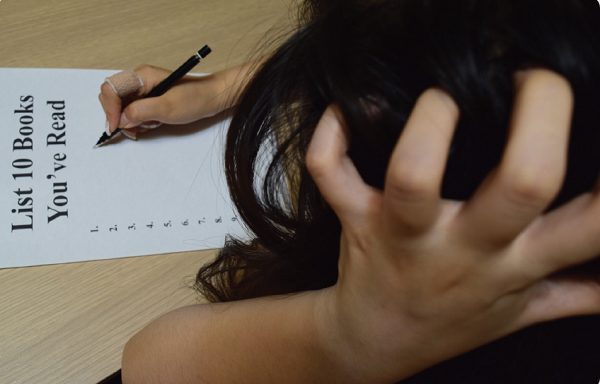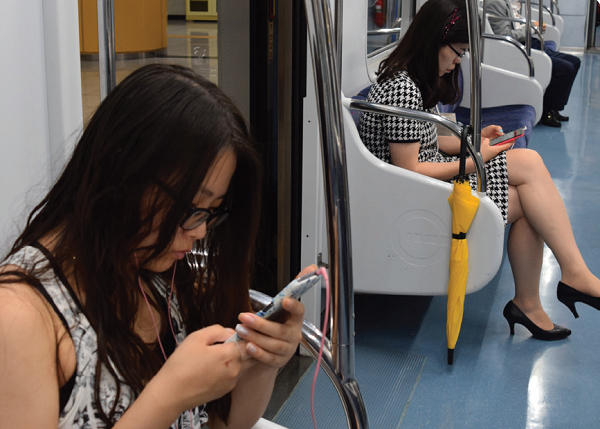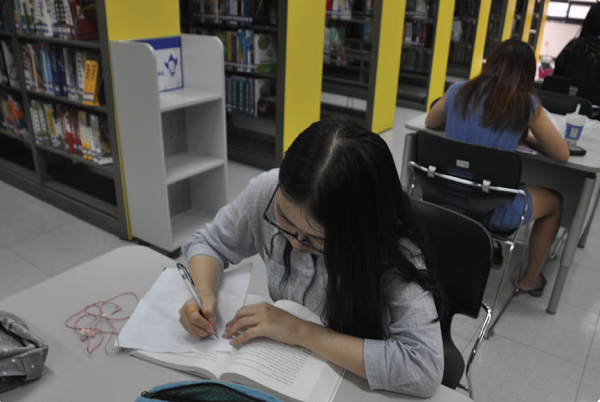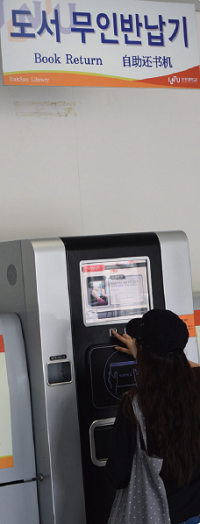
Take a piece of paper and write down 10 books you’ve read and would recommend to your friends. Did you find the task hard? If it is hard, don't fret, you are not alone. Many university students will find the task difficult and might find themselves stuck remembering the names of any books they’ve read recently for pleasure and not for a test. People praise the importance of reading, and no one will deny that reading is good for us. Still, it is hard to see a student reading on the subway or bus nowadays.

A Long and Vicious Circle
University students who do not read books have been problematic for some time in Korea. There have been a lot of campaigns encouraging the importance of reading, hoping to increase the number of books students read. However, as time passes, students continue to read less, causing the number of libraries to shrink, which creates embarrassing statistics. According to Korea Education and Research Information Service, among all universities in Korea, students only borrow on average 7.8 books per person a year, with 42% of 4-year-university students not borrowing a single book the entire school year.1 The decrease in borrowing is chained to other phenomenon such as the reduction in the number of university libraries. Korean Higher Education Institution reported, “Combined, the top 30 Korean universities, as ranked by their number of library books, reported fewer possessing books compared to the top 4 North American university libraries.”2 The low numbers of university library books are directly related to the smaller budget amount Korean universities allocate to their libraries. In addition to students reading fewer books, universities are currently allocating less budget funds for student books, so it is an endless vicious circle.
When the Sookmyung Times asked 207 Sookmyungians were asked why they no longer read as much as before, 72.6% of Sookmyungians answered they were busy with everyday life and study. Related statistics indicated that 80.8% of Sookmyungians said that they only used the library to study. These statistics are clearly shown as seen by the crowd of students flooding the library during the examination period while it remains empty at other times. Also, just a quick scan of the library shows how most Sookmyungians use the library solely for studying. There are rarely students there reading books.

Boomerang—the Rebounding Circle
The problems arising from ‘not reading’ are not instant, so people tend to ignore the warnings and encouragement. It is easy to simply overlook reading as a minor problem, but this lack of reading is a boomerang that ultimately returns to create bigger problems. “Reading is not a hobby but a habit.” This saying implies it is hard to read if one is not accustomed to reading in the first place. Lee Taeeun, Department of Political Science & International Relations ’15, said “It is hard to read my major’s or test related books because I never developed a proper reading habit.” Students neglect reading because they are busy rushing to find a job and studying for their future. However, in one way or another, reading is essential to life, and reading less will ultimately make one harder to work on one's studying or everyday lives. Ironically, as Sookmyungians statistic shows, the reason why they do not read is because they are busy with studying and everyday lives.
Reading less is like the action of a boomerang because it does not help reduce one’s stress. According to Dr.David Louis’s team of Cognitive Neuroscience at the University of Sussex, reading a book is the best way to relieve stress. When measured, 6 minutes of reading reduces 68% of one’s stress, lowering one’s heart rate and muscle stress.3 Students neglect books in their search for new ways to reduce stress, but the answer is to read. People are more and more stressed from their daily lives, resulting in an increase in the number of people suffering from the Burn-out syndrome. A number of people are seeking relief from digital media; however, the best way to reduce stress is by reading books, not surfing through digital media forums. In other words, the less one reads, the less one can enjoy relief from stress.

Do Not Throw That Boomerang
Before libraries can change, related laws and regulations need changing. The government’s new Library Promotion Act of 2015 is a good start, but it still needs work. The new promotion act does not state clear standards of promotion, for it only states recommendations and sets vague university change requirements. It needs to set forth clear criteria that keep the quality and quantity of school libraries. Also, the current Korean University Accreditation Institute has no direct index of university library evaluation, and in addition, only a small part of the library is evaluated. Therefore, mark distribution for a particular school library should be independently designated on the university ranking in order to force universities to be more proactive.
For students, encouraging them to read is the best solution. Nowadays, encouraging students to read by SNS is attracting attention. People are asked to open a book up to a random page, read the page and post a memorable line from the page on an SNS site with a special hashtag. The hashtag on the posting must be clearly marked “Bookfun.” This campaign mimics the Ice bucket Challenge by having participants openly state who they wish to partake in the Bookfun challenge after themselves. With a one line posting, people can ponder the context of the whole book or merely release stress with free thoughts. Lee Hyerin from the Division of Law ’15 said, “I was surprised that I could have so many thoughts just after reading a single line of a book page. I then became curious about the rest of the book.” This small campaign is a baby step towards creating better reading habits.

Flawless Book, Flawless Readers
Charles Eliot, President of Harvard University, said, "If you were to spend just 15 minutes a day reading the right books, a quantity that could fit on a five foot shelf, you could give yourself a proper liberal education." The importance and the benefits of reading are well established, and well known. Even if one neglects reading, one surely does not ignore its importance, but the difference is huge between those that know but not read, and those that knows and read. Even though one may know the importance of reading, one must act and university schools must act too, for the benefits of a healthy reading habit benefits the individual as well as the library itself.
1 Bae Duheon, Jang Pilsu, “40% of University Students …,” The Herald Business, April 23, 2015
2 Kwon Eunsun, “University Library, ‘Age of Regression’,” Kumganggilbo, April 5, 2015
3 Segyeilbo Issue Team, “The Definition of Stress, No.1 Way…” Segyeilbo, July 13, 2015


